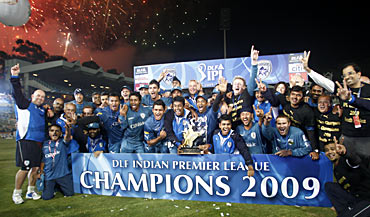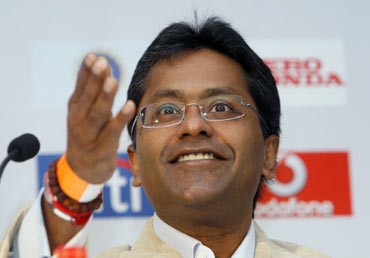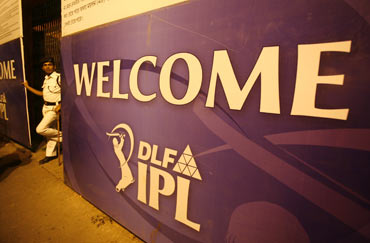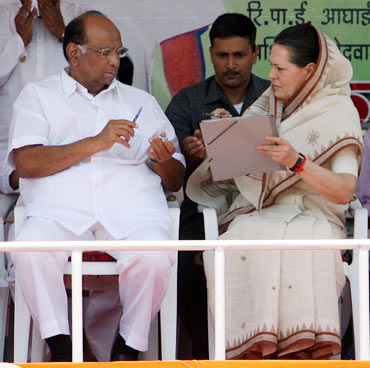 | « Back to article | Print this article |
Mammoth deception by money-hungry businessmen
As the IPL fiasco gets bigger and murkier, cricket managers and politicians alike are trying their best to prevent India's premium brand from blowing up in their faces. Each day brings forth a new set of revelations, controversies, allegations and rebuttals.
Sheela Bhatt explores the tangled web of deception, lies and money woven by IPL Commissioner Lalit Modi, former BCCI chief Sharad Pawar and the UPA government.
On April 23, Indian lawmakers demanded a Joint Parliamentary Committee probe into the damning evidence that has emerged against the Indian Premier League's management, particularly against IPL Commissioner Lalit Modi, the chief architect of the cricket tournament, who created Brand IPL, valued at more than $4 billion.
Many fear that something that started with the mammoth deception by money-hungry businessmen may end with all too familiar political deception.
Finance Minister Pranab Mukherjee has hinted that the United Progressive Alliance government is seriously considering instituting the JPC to look into the IPL's murky affairs.
The unfolding IPL details are "bigger than one ever imagined," says political commentator Swapan Dasgupta. Talking about Lalit Modi's revelations and following raids and surveys by the income tax department, he says, "When you put a stick into a hornet's nest, they are bound to fly in all directions."
Asked if the raids and searches will lead to spring cleaning of the country's cricket management, Dasgupta, one of the most seen faces on Indian television news channel talk shows, says, "The government can't get engaged in the clean-up act. It has to be the Board of Control for Cricket in India's effort. I do find that there is a little vindictive motive behind the government's act."
The issue began with a series of messages Modi posted on Twitter on April 11. They were intended to embarrass Shashi Tharoor, the minister of state for external affairs. Those missiles have veered wildly, and hit three ministers of Prime Minister Manmohan Singh's government already.
The IPL has lost its innocence
The biggest story that has emerged out of the IPL-Tharoor muddle is that the Congress party has amassed weapons to deliver a major political blow to former BCCI chief and Agriculture Minister Sharad Pawar and his Nationalist Congress Party. Pawar's daughter and Member of Parliament Supriya Sule's husband Sadanand Sule owns a 10 percent stake in the company that was awarded IPL television rights for 10 years at $1.2 billion. After denying the allegation, Supriya admitted that her husband inherited the shares from his father.
Aviation Minister Praful Patel is one of India's most media-savvy Indian politicians, but his daughter's role in the IPL's back office and his own involvement with Tharoor -- who resigned from his post on April 18 -- has robbed him of his camera smile.
The JPC is considered the 'icebox' to put in deep freeze major political controversies. JPC or no JPC, the Congress party has hit its adversary.
Every day, leaks and revelations, substantiated and unsubstantiated, tumble out. Some allege the matches were fixed and insiders betted on outcomes.
The net effect -- the IPL has lost its innocence.
Modi's personal attack on Tharoor, Modi's alleged arm-twisting of the newcomer investors in the IPL Kochi team and Modi's relatives' involvement in companies connected to the IPL exposes politicians' patronage to the business of cricket and innumerable ways in which kickbacks may have been given to politicians and cricket bosses. At stake are billions of rupees in profit that the passion of billion-plus cricket lovers generates in India. The investigation details -- being leaked by government agencies -- suggest that the IPL was becoming a machine to legalise black money that robust economic growth gave in abundance to India's rich and famous.
Ironically, India's biggest sporting event is just three years old. The 'made in India' product was supposed to represent the new ethos of a new India. Sadly, not many Indians are proud of the country's fastest rising brand today.
IPL was a web of lies, half truths and fake realities
It has turned out that the IPL was a web of lies, half truths and fake realities.
The government has been one of the biggest manipulators in the fiasco.
The IPL -- no matter how sleazy its business model might be -- unleashed trapped cricketing talent in India. It was a successful cocktail of 20-over cricket, glamour and that mother of all deceptions, the television camera. Indian summer evenings were never so delightful. But when Modi tried to turn the IPL into an exclusive club of a few rich Indians, he got his politics wrong.
The problem is that all the characters involved in the controversy are in the great game -- of deception.
The way the IPL became an overnight success and the kind of money that was flowing in -- in paying cricketers (anything between Rs 50 lakh to Rs 6 crore), in paying stadium fees (Rs 50 lakh-plus per match), in paying for telecast rights and sharing of profits with franchises, someone in the government should have asked: From where is the money coming? The income tax department could have tracked the money trail. But the government kept mum, the finance ministry and its revenue arms did not take any proactive role by sending a letter asking the IPL and the BCCI about the source of their funds and profit-sharing arrangement. They have done that now, because of political expediency. So, one presumes they were silent on purpose.
Modi, according to the government's investigation, paid Rs 33 lakh as tax when the IPL began in 2008. This accounting year, he paid Rs 11 crore as advance tax. The tax department probed his sources of income much before Tharoorgate, but no action was taken. The note prepared by tax sleuths was overnight leaked to a business daily when the political ground was prepared to reap the benefit of the expose.
Stars are likely to lose their shine
After the embarrassment of Tharoor's exit, the government investigated not only IPL Kochi's link to Tharoor but also franchise investments and sources. The preliminary investigation was leaked to the media. The result: Unprecedented violation of rules and complete lack of business ethics are being exposed. A huge chunk of the IPL money has come from Mauritius, a euphemism for black money and anonymous transactions in the Indian bazaar. Any Indian government department normally takes three years to track down the source of money abroad in such cases.
In this muck, movie stars like Preity Zinta, Shilpa Shetty and even superstar Shah Rukh Khan -- all connected to IPL franchises -- are likely to lose their shine.
The story goes that if Modi had not tried to arm-twist IPL Kochi in the first week of April, there would be no scam, no scandal. The government woke up only when Tharoor was running from pillar to post for political help to save IPL Kochi. The allegation is that Modi wanted a grip over IPL Kochi or wanted to scuttle it so that the Videocon or Adani group of companies could have their own team.
Not only did the government not act even when things were happening under its nose, it remained silent about Tharoor's attempt to save the IPL Kochi bid. Before Modi hit Tharoor, the government could have taken up cases against Modi. The government, sources insist, has details of how Modi rigged the third round of bidding for the new IPL team. The IPL had opened the tenders of two companies and changed the bid figures. BCCI president Shashank Manohar had objected to it, and scuttled the process.
Right now, the UPA has a slim majority in Parliament and needs every MP that it can add. Still, it has preferred to probe Modi further. And that has hit Sharad Pawar, the UPA's powerful minister and the Congress party's important ally, hard.
The Congress party has done some cold calculations: Pawar cannot quit the government because any action in New Delhi will affect the NCP-Congress party ruling alliance in Maharashtra. So, Pawar will be in no position to leave the trappings of power and put up a strong fight against the charges against him.
But why is the UPA -- which needs the numbers in parliament -- hitting out at Pawar?
The answer lies in the government's soft handling of corruption cases against Uttar Pradesh Chief Minister Mayawati, in wooing Jat leader Ajit Singh and even Orissa Chief Minister Naveen Patnaik of the Biju Janata Dal.
It is reported -- and, not denied by the government -- that after Modi hit out at Tharoor, the investigative agencies got hold of Modi's telephone conversations of April 16, 17 and 18. Those conversations nailed many stalwarts of the cricket world. The government's agencies also have text messages and e-mails of IPL managers that show Pawar and Patel's involvement.
An unscrupulous India of 2010
Finance Minister Mukherjee and Home Minister P Chidambaram 'briefed' Pawar on April 20. After the meeting, Pawar left Modi to his fate; the Maratha veteran was now fighting his own battle for credibility.
In his nearly 50-year political career, Pawar has faced much more serious charges. He stood his ground and his political and business empire was never affected. Now the Congress party may have finally nailed its old adversary who once opposed party chief Sonia Gandhi's foreign origin and started his political party on that plank.
Pawar has 'bought' temporary peace in his meeting with Congress party leaders. The Congress party has won the battle; it would like to end the war.
The BCCI is also likely to get hurt. Its managers have been masters in deceiving cricket fans and weaving webs of excuses since many years.
There are 13 members in the governing board of the IPL and each one of them is a stalwart in his own field, including BJP leader Arun Jaitley, Congress MP Rajiv Shukla and former Indian cricket captain M K Patuadi.
Each scandal tumbling out the IPL's closet reveals a story about the black money behind the emerging sporting brand and an unscrupulous India of 2010.
Modi was considered a 'one-window' clearance in the Vasundhara Raje-led Rajasthan government for business proposals in the state. In spite of drug charges, in spite of his arrogance and in spite of his brash methods, BCCI and state cricket associations followed him blindly.
Now, he is seeking help from industrialist Mukesh Ambani to save himself from the Indian State's heavy hand.
Indians, who have witnessed much drama over corruption charges against politicians, do not have any particular sympathy or trust for the government.
The government, in its turn, is busy in conducting a witch hunt via the investigation agencies, which will eventually go nowhere.
Young voters, who were awestruck by the IPL, are now reading with disbelief how crores came from abroad for the tournament.
One hopes that IPL's brand value won't crumble if Modi falls. After all, IPL as a brand was built only due to the emotional involvement and fervent devotion millions of Indians have for cricket.




